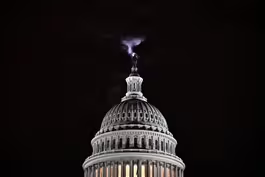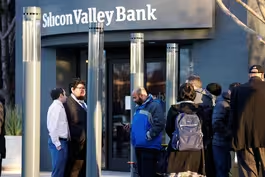
The risks student-athletes face amid sports betting boom
Clip: 3/13/2023 | 8m 46sVideo has Closed Captions
The risks student-athletes face amid sports betting boom
March Madness brackets are set and with it comes billions of dollars in bets on the games. Paul Solman recently reported on betting companies partnering with universities and the threat it poses for students. But it turns out problems are even more acute for student-athletes. This story is a partnership with the Shirley Povich Center for Sports and the Howard Center for Investigative Journalism.
Problems playing video? | Closed Captioning Feedback
Problems playing video? | Closed Captioning Feedback
Major corporate funding for the PBS News Hour is provided by BDO, BNSF, Consumer Cellular, American Cruise Lines, and Raymond James. Funding for the PBS NewsHour Weekend is provided by...

The risks student-athletes face amid sports betting boom
Clip: 3/13/2023 | 8m 46sVideo has Closed Captions
March Madness brackets are set and with it comes billions of dollars in bets on the games. Paul Solman recently reported on betting companies partnering with universities and the threat it poses for students. But it turns out problems are even more acute for student-athletes. This story is a partnership with the Shirley Povich Center for Sports and the Howard Center for Investigative Journalism.
Problems playing video? | Closed Captioning Feedback
How to Watch PBS News Hour
PBS News Hour is available to stream on pbs.org and the free PBS App, available on iPhone, Apple TV, Android TV, Android smartphones, Amazon Fire TV, Amazon Fire Tablet, Roku, Samsung Smart TV, and Vizio.
Providing Support for PBS.org
Learn Moreabout PBS online sponsorshipAMNA NAWAZ: Well, brackets are set for the men's and women's NCAA Tournaments, meaning March Madness is officially here, and, with it, the billions of dollars in bets on the games.
We recently reported on sports betting companies partnering with universities to promote their brands on campus, and the threats it poses for students, many of whom are under the legal betting age.
But it turns out problems are even more acute for student athletes.
Paul Solman is back now with our latest report.
And this story is a partnership with the Shirley Povich Center for Sports Journalism and the Howard Center for Investigative Journalism, both at the University of Maryland's Merrill College of Journalism.
STEVIN SMITH, Former Arizona State University Basketball Player: So, you're telling me we can win the game and I can make money?
MAN: Yes.
STEVIN SMITH: (EXPLETIVE DELETED) no-brainer.
PAUL SOLMAN: In 1994, decades before the Supreme Court overturned a ban on college sports betting, Arizona State University star point guard Stevin Smith was paid $20,000 by a gambler to make sure his team didn't win by more than six points.
STEVIN SMITH: I just scored 39 points, and we won the game.
It's all about winning.
As long as you're winning, nobody ever suspect nothing.
PAUL SOLMAN: Smith was eventually caught, however, went to prison.
His fall is featured in the Netflix series "Bad Sport."
His justification at the time?
STEVIN SMITH: We were making the school all that money, and we did not get compensated at all.
PAUL SOLMAN: That is, money universities receive, mainly from TV deals and advertisers, not a dime of which, until recently, went to players.
These days, star college athletes can make serious money through name, image and likeness sponsorship deals.
But with sports betting now legalized in many states, student athletes no longer have to fix games to become vilified.
For example, in the state of Ohio, where sports gambling became legal in January, the University of Dayton basketball team lost a heartbreaker after leading big at halftime.
Accusations, presumably by gamblers who lost bets, promptly followed.
"You rigging games for sure.
What a chump," tweeted someone.
"Hope you get caught."
But there was absolutely no evidence of foul play.
At a press conference, coach Anthony Grant recoiled at the new gambling environment.
ANTHONY GRANT, University of Dayton Head Basketball Coach: It could really change the landscape of what college sports is all about.
And when we have people that make it about themselves and attack kids because of their own agenda, it sickens me.
PAUL SOLMAN: The Ohio state gambling regulator has now threatened to ban anyone who attacks athletes online.
TREVER WRIGHT, University of Cincinnati: Irrespective of gambling, the pressure on these kids to perform is immense.
PAUL SOLMAN: Trever Wright helps run rules compliance at the nearby University of Cincinnati.
TREVER WRIGHT: I'm really worried that now, because it's legal in Ohio and students of the university and general public are gambling on the University of Cincinnati basketball and football games and other events, that now they're publicly going to come out via social media or just in the crowd in general and say, "You cost me money."
And what does that do to the mental health of that athlete?
PAUL SOLMAN: Now, the NCAA prohibits it's athletes from betting and warns athletes about gambling during and after their college careers.
CLINT HANGEBRAUCK, NCAA Compliance Chief: It's really challenging just to keep up with.
PAUL SOLMAN: NCAA compliance chief Clint Hangebrauck.
CLINT HANGEBRAUCK: From a state-by-state level, they're kind of legalizing the activity and then, after the fact, trying to adjust to that and put in place a lot more regulation and integrity efforts.
So, our primary concerns are twofold.
One would be the health and well-being of our student athletes.
And second-fold would be the integrity of our competitions.
PAUL SOLMAN: And there's actually another concern, which is why the NCAA helps pay for former English pro rugby player Mark Potter to scare student athletes straight by confessing his story, including his near suicide.
MARK POTTER, EPIC Risk Management: I drove down the road, sat on a train station bridge and tried to psych myself up to jump off in front of one.
PAUL SOLMAN: Because Potter was a compulsive gambler, as some 6 percent of all gamblers.
At an even much higher rate are college-age gamblers, first time away from home, maybe drinking too much.
And college athletes are several times more likely still to become addicted, says Potter, for lots of reasons.
MARK POTTER: Whether you feel like you have more sporting knowledge, whether you are using the competitive drivers and your almost will to win to try and succeed at it, whether you are trying to replicate what you're not getting out of your sport.
PAUL SOLMAN: Potter shared his own story recently at the University of Cincinnati.
MARK POTTER: I got injured.
And that is honestly one of the worst things that ever happened to me.
PAUL SOLMAN: In just his second year as a rugby pro at 19, Potter sustained a series of injuries that kept him off the field.
Hurt, bored, gambling became his way to replace the competitive high.
Within a few short years: MARK POTTER: I was 24, and I was 70 grand in debt.
I had no job at the end of the year, no prospect of another contract, and I suddenly got an Irish girl pregnant who lived in a different country.
PAUL SOLMAN: He moved to Ireland, started a family, and vowed the betting was behind him.
But it wasn't.
MARK POTTER: It started to become more and more unmanageable.
And I had to go to great lengths to hide it from her.
I used to have a house phone, and I used to pull the cord slightly out of the wall before I went to practice, because I didn't want people ringing her asking her for money when I wasn't there, and I couldn't answer it.
PAUL SOLMAN: The money for household finances was going toward bets, until one day: MARK POTTER: Repo man came to our house and gave us an eviction notice, I hadn't paid our mortgage for months.
And she didn't know.
I owed $6,000 for a mortgage, and I had $42 in my bank account.
PAUL SOLMAN: The story becomes ever more harrowing.
Potter was arrested, ostracized, but even that didn't deter him.
MARK POTTER: I went into my town, and I sold my wife's engagement ring and all of my kid's toys for $500.
I had to.
I literally couldn't stop myself from doing it.
And I did it, fully assuming that I was going to win the money to pay it back.
PAUL SOLMAN: OK, enough.
You get it by now, as did the student athletes, though we weren't allowed to shoot interviews or show their faces.
But, off camera, they were blown away, especially with pawning the kid's toys.
Potter eventually reconciled with his family.
After years of rehab, this is his ongoing therapy.
MARK POTTER: Ultimately, my sports career was a failed one, and it was a failed one because of what was going on in the background.
So the next best thing from that is to be able to provide information, so other athletes don't have to go down the same route.
PAUL SOLMAN: But why is a former English rugby star focusing on America?
PAUL BUCK, EPIC Risk Management: It's a country that's 320 million people, 50 states, all with either no regulation or different regulation.
PAUL SOLMAN: Paul Buck founded the firm Potter works for.
PAUL BUCK: It really feels that this is a country where we should be spending most of our time from a prevention point of view, because it feels like where we're needed the most.
PAUL SOLMAN: The company promotes education through lived experience, like Bucks, once a banker and such a problem gambler himself, he actually tried to commit suicide.
PAUL BUCK: I felt that the world would be a better place without me, you know, be that my wife, be that my kids, be that my employer, be that my friends.
That's how low a place it can take you if gambling does get ahold of you.
PAUL SOLMAN: Via Buck's firm, Potter was brought to Cincinnati not just by the NCAA, but by European gambling giant Entain.
So, you're a gambling company that's doing education.
Are you just protecting yourself, protecting your image?
MARTIN LYCKA, Entain: No, we're doing education to achieve long-term sustainability of these markets.
So, we're protecting the industry, that is right, but we're also protecting customers, our customers, the industry-wide customers, as well as the public at large.
PAUL SOLMAN: By trying to scare the most vulnerable among us straight, because in a free-for-all free market, college kids need all the protection they can get.
For the "PBS NewsHour," Paul Solman in Cincinnati.
Biden approves controversial oil drilling project in Alaska
Video has Closed Captions
Clip: 3/13/2023 | 4m 44s | Controversial oil drilling project in Alaska approved by Biden administration (4m 44s)
Congress battles over priorities, but finds some agreement
Video has Closed Captions
Clip: 3/13/2023 | 5m 16s | Congress battles over conflicting priorities, but finds some bipartisan agreement (5m 16s)
Drought, overdevelopment cause record low water levels
Video has Closed Captions
Clip: 3/13/2023 | 8m 2s | Persistent drought and overdevelopment cause record low water levels for tens of millions (8m 2s)
Government takes steps after collapse of banks sparks fears
Video has Closed Captions
Clip: 3/13/2023 | 11m 30s | Government takes steps to shore up confidence after collapse of two banks sparks fears (11m 30s)
How 'Everything Everywhere All at Once' may change Hollywood
Video has Closed Captions
Clip: 3/13/2023 | 9m 3s | How the Oscar wins for 'Everything Everywhere All at Once' could change Hollywood (9m 3s)
Providing Support for PBS.org
Learn Moreabout PBS online sponsorship
- News and Public Affairs

FRONTLINE is investigative journalism that questions, explains and changes our world.

- News and Public Affairs

Today's top journalists discuss Washington's current political events and public affairs.












Support for PBS provided by:
Major corporate funding for the PBS News Hour is provided by BDO, BNSF, Consumer Cellular, American Cruise Lines, and Raymond James. Funding for the PBS NewsHour Weekend is provided by...




